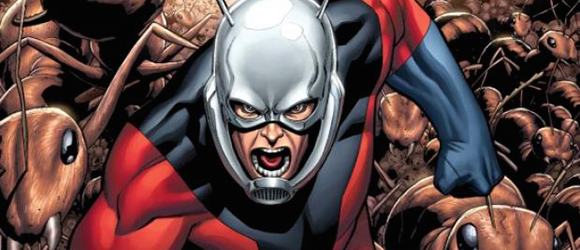Is This Why Edgar Wright Left Ant-Man?
Today in things that make us scream incoherently

Have your boulder of salt ready, because the basis for The Hollywood Reporter saying “Guys, we totally know why Edgar Wright left Ant-Man!” is that most beloved of entertainment journalism stalwart: The anonymous source. But it can be a small boulder, because the reason sounds well within the realm of possibility. Behold: Edgar Wright vs the Creative Hive Mind. And I’m not pleased.
Via THR:
“sources say Marvel had been unhappy with [Wright’s] take on Ant-Man for weeks. Originally set to begin shooting June 2, the production had been put on hiatus while [Marvel Studios president Kevin] Feige ordered revisions of the script that was co-written by Wright and Joe Cornish. According to sources, Wright had been willing to make revisions earlier in the process. But the new rewrites took place without Wright’s input, and when he received Marvel’s new version early during the week of May 19, he walked, prompting a joint statement announcing his exit ‘due to differences in their visions of the film.'”
Further, those good ol’ anonymous insiders say “Marvel feels it already might have gone outside its comfort zone with August’s Guardians of the Galaxy,” so the pressure was on for Wright—who was attached to Ant-Man since before a cinematic incarnation of Rocket Raccoon was even a blip on Feige’s radar—to get back to the good ol’ Marvel Studios’ homogenous vision. As a superhero named “Ant-Man” isn’t somewhat inherently ridiculous anyway.
Look, I like the MCU: Their output is generally solid and entertaining, and I enjoy their characters. The films aren’t great feats of moviemaking, but—and I’m going to risk sounding like a snob here—they’re gigantic Hollywood blockbusters, and I don’t tend to fall head over heels for those, because with few exceptions most of what they present are things I’ve seen dozens of times before. There are exceptions: Pacific Rim, for example, had a sense of unironic, unapologetic joy that felt refreshing after years of “gritty” action movies. That’s not to say I didn’t enjoy, say, Captain America: The Winter Soldier or Thor. I did. But they didn’t fill me with the magical feeling I had in 2007 when I sat down to watch Hot Fuzz, that feeling of “Holy crap, I’ve never seen anything quite like this movie before.”
And apparently Marvel Studios doesn’t want you to have that feeling, because its twin brother—”Holy crap, what the hell is this hot mess?”—has been known to pull the uninvited houseguest routine. Again, from THR:
“‘Kevin Feige [and his top lieutenants] run Marvel with a singularity of vision, but when you take a true auteur and throw him into the mix, this is what you get,’ says a source. ‘They don’t want you to speak up too much or have too much vision. People who have never worked there don’t understand how they operate, but if you trust them, they have an amazing track record.'”
Amazing? Maybe. Amazingly consistent? You betcha. The Incredible Hulk is the only MCU film that could be considered a box office flop. Even Iron Man 2, along with Hulk the most poorly reviewed of the MCU’s films, made over $300 million just in the US. Nothing’s a guarantee in the movie business save that every Michael Bay movie will have explosions, but it’s a pretty sure bet that any MCU movie is going to make bank unless it’s directed by, like, Uwe Boll or someone. Marvel Studios has power. It’s a shame that they didn’t have the courage to throw that power behind Wright’s creative vision.
Like this excellent piece on Forbes points out, they don’t need to, strictly speaking: For all the fan contingent may flip their shit at Wright being fired or Ben Affleck being cast as Batman or Star Trek 3 being directed by Roberto Orci, we’re really a fairly small percentage of the audience the studios want to reach, and besides that in all honesty we’re probably going to see the movies we’re complaining about anyway. I know I’ll be there for Ant-Man. But it doesn’t make it any less disappointing that MCU isn’t willing to engage in a bit of heroic risk-taking because it might lose them money, especially when you consider the MCU was built on just such a risk: How much of the mainstream, non-comics-fan audience who turned out in droves to see Iron Man even knew who Tony Stark was before Robert Downey Jr put on the suit? He was B-list, and now he’s one of the crowning figures in the most financially successful franchise in film history.
Film Crit Hulk, as he tends to, put it best:
A FAMILIAR STORY: BRAVERY LEADS TO SUCCESS. SUCCESS LEADS TO FEAR OF LOSING SUCCESS. FEAR LEADS TO SAFE, HOMOGENOUS THINKING.
— FILM CRIT HULK (@FilmCritHULK) May 23, 2014
For Wright’s part, he tweeted a (now-deleted) picture of a sad-faced Buster Keaton holding a Cornetto, a reference to Wright’s Cornetto trilogy and possibly also the fact that Keaton made the jump from independent auteur to creatively stifled corporate cog when he signed with MGM in 1928, a move he later referred to “the worst mistake of my career.”
I guess there’s the silver lining: If Feige was going to make Wright sacrifice his vision, at least he got out before The Man finished nailing the coffin. We were going to end up with Marvel Studios’ vision of Ant-Man either way.
Are you following The Mary Sue on Twitter, Facebook, Tumblr, Pinterest, & Google +?
Have a tip we should know? [email protected]